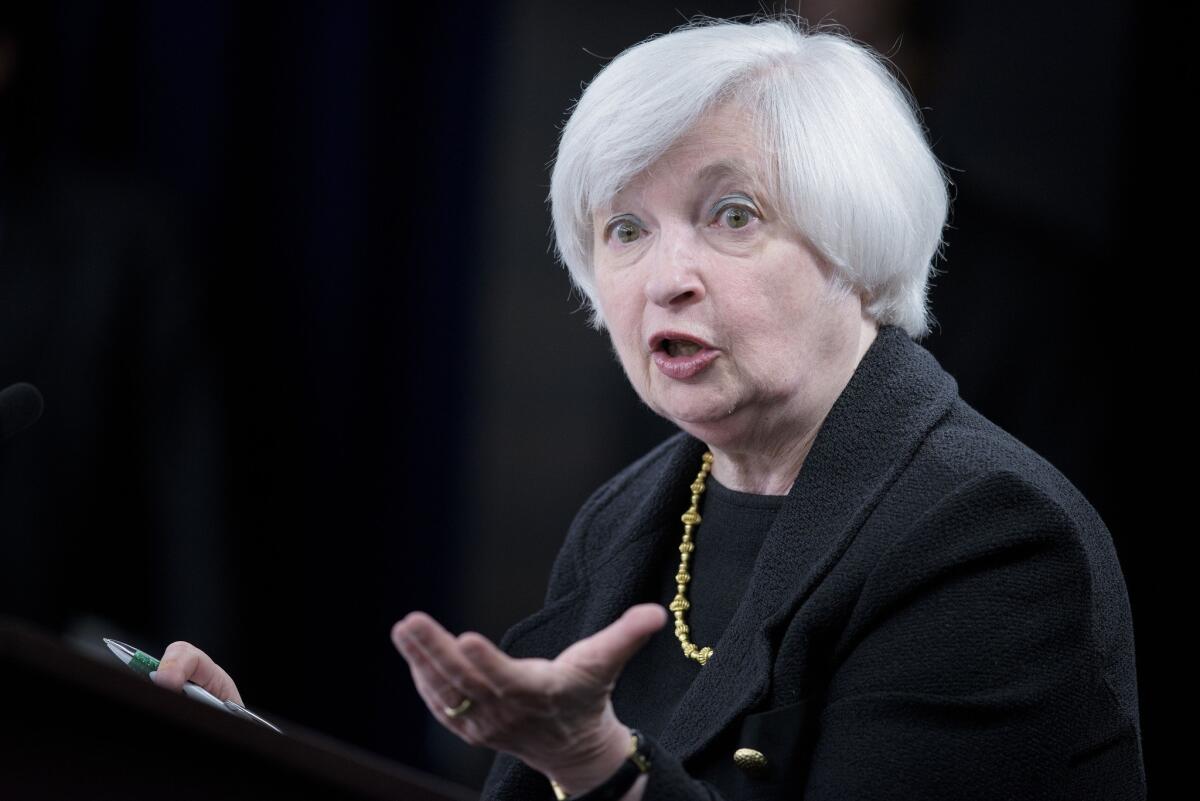Yellen expects rate hike this year ‘unless the economy surprises us’

Federal Reserve Chairwoman Janet L. Yellen speaks during a news conference Thursday in Washington.
- Share via
Federal Reserve Chairwoman Janet L. Yellen said she expected the central bank to raise a key interest rate this year “unless the economy surprises us.”
Speaking publicly for the first time since the Fed opted to hold the rate steady last week, Yellen said Thursday that “considerable uncertainties” surround the U.S. economic outlook.
She ended her hour-long talk abruptly after coughing a number of times near the end. A Fed spokesman said she felt dehydrated after the long speech under bright lights. She was seen briefly by a medic off-stage, felt fine and resumed her schedule Thursday evening, the spokesman said.
During the speech at the University of Massachusetts in Amherst, Yellen said there was a “risk that a slowdown in foreign growth might restrain U.S. economic activity somewhat further.”
Global financial markets have been tumultuous in recent weeks after China devalued its currency last month, a sign its economy might be slowing.
Still, Yellen emphasized that she and other members of the policymaking Federal Open Market Committee didn’t expect that to derail the first rate hike in nearly a decade.
“The committee is monitoring developments abroad, but we do not currently anticipate that the effects of these recent developments on the U.S. economy will prove to be large enough to have a significant effect on the path for policy,” Yellen said.
The lengthy address looked at the effects of inflation on monetary policy in the past and how price expectations play into the Fed’s decision-making now as they consider lifting the federal funds rate from the near zero-level it has been since late 2008.
Strong job growth in recent years has pushed the U.S. near full employment — the unemployment rate fell to 5.1% in August — but inflation has remained well below the Fed’s annual 2% target.
Yellen said sharply lower oil prices and the rising value of the dollar have kept inflation down recently. But Fed policymakers were confident that those were temporary factors and that “inflation will gradually return to 2% over the next two or three years.”
In economic forecasts released last week, Fed officials projected inflation would be 0.4% this year and not hit the central bank’s annual 2% target until 2018.
The Fed has a dual mandate to maximize employment and keep prices stable. Yellen said she and most Fed policymakers anticipate that “achieving these conditions will likely entail an initial increase in the federal funds rate later this year, followed by a gradual pace of tightening thereafter.”
“But if the economy surprises us, our judgments about appropriate monetary policy will change,” Yellen said.
Some analysts have said the Fed should wait to raise rates until the economy is at full employment and inflation is back to 2%. Acknowledging the argument, Yellen said that would risk harming the economy because there is a lag in the effects of monetary policy changes.
“If the FOMC were to delay the start of the policy normalization process for too long, we would likely end up having to tighten policy relatively abruptly to keep the economy from significantly overshooting both of our goals,” she said.
“Such an abrupt tightening would risk disrupting financial markets and perhaps even inadvertently push the economy into recession,” Yellen said.
After their meeting last week, Yellen said she and her colleagues wanted “a little bit more time to evaluate the likely impacts on the United States” of the recent financial market turmoil, which could be a signal of a global economic slowdown.
Fed officials could act as soon as their next meeting in late October. But Fed policymakers might have trouble determining the effects on the U.S. if a budget dispute leads to a federal government shutdown.
The fiscal year ends Wednesday. If Congress and the White House can’t agree on at least a short-term spending bill, the next batch of data — including the September jobs report scheduled to be released next Friday — could be delayed until the government reopens.
A 16-day partial government shutdown in October 2013 caused the Labor Department to delay releasing the September jobs report for 2-1/2 weeks.
The next meeting of Fed policymakers is on Oct. 27-28, and Fed officials probably would need updated data on jobs and other economic indicators to decide on an interest rate hike.
Obama administration officials hope there will not be a shutdown, but as a precaution they are reviewing contingency plans, Labor Department spokesman Stephen Barr said Thursday.
+++
Follow @JimPuzzanghera on Twitter
ALSO:
Profound changes in China are straining its economic ties with the U.S.
At Hewlett-Packard, Carly Fiorina snuffed out a beloved tech culture
L.A.’s largest craft brewer Golden Road tapped in latest beer deal
More to Read
Inside the business of entertainment
The Wide Shot brings you news, analysis and insights on everything from streaming wars to production — and what it all means for the future.
You may occasionally receive promotional content from the Los Angeles Times.











